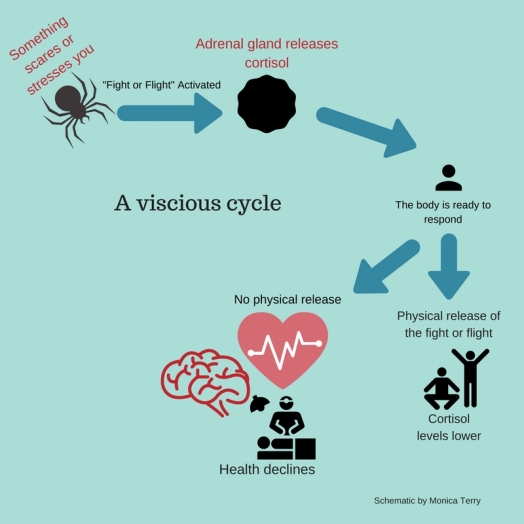In the daily hustle and bustle of life, we can often become run down and simply stressed out. Cortisol has been called the Stress Hormone and is one of our bodies worst enemies. When your cortisol level is high, it can disrupt your memory and learning, decrease your immune system, decrease bone density, increase how fast you gain weight, increase blood pressure, cholesterol and heart disease. These are just the high-lights of a long list of effects from constant stress and increase in cortisol levels.
Increase in cortisol and stress can lower life expectancy as well. Here is how it works in a simplified schematic:

Something stresses or scares you initially and the Fight or Flight response is then activated. The adrenal gland releases cortisol in response to the trigger. The body is now ready to ward off the threat or flee. In some cases in which there is something that you anticipate will be exciting or a challenge, the fight or flight response is also triggered, but there is a physical release of the response once the event passes. However, when the body is in a state of constant stress and it can not achieve a physical release of the fight or flight response, our problems begin such as the ones stated above.
If we do not find a way to return the cortisol level to normal, our health will decline, however, these are some simple things we can do to combat stress and high cortisol levels:
- Prayer & Meditation: People that believe in a higher power in this universe have been proven to handle stress better. I personally believe that our Heavenly Father is in control of ALL. Prayer is a powerful tool in the lives of my family on a daily basis. For some people, techniques such as Yoga work extremely well to keep their stress level down and to provide a physical release. Allowing the Spirit to heal or recover is key to the physical following suit.
- Regular Exercise Routine/Activity: Well I think I have you covered on this one with my Taptutor Sessions! Aerobic activities such as dancing, walking, jogging, swimming, biking, or skating are all effective ways to recreate the ‘flight’ outlet and get rid of cortisol. If you exercise just 20-30 minutes several days out of the week, it will lower your cortisol level and keep it lower long-term.
- Connection to Community: Of course having a supportive network of family and friends positively affects almost everything in our lives. When the world sends us too much to handle, others can be recruited to help take on the load. Don’t feel afraid to lean on a family member or friend and take some time for yourself, or better yet, take some time to enjoy your relationship and show them how grateful you are to have them in your life.
- Music Currently it has been found that music around 60 beats per minute can cause synchronization of the music beat with the brain, which then causes alpha brainwaves (frequencies from 8 – 14 hertz or cycles per second). Faster music can invoke a happy and upbeat response while slow and calmer music can just make you want to go into “chill mode”. When we are relaxed and conscious, these alpha brain waves are present. Stanford University Researchers (press release 2006) reported that “listening to music seems to be able to change brain functioning to the same extent as medication.” Due to the fact that music is so accessible these days, these researchers concluded that it is an easy tool to apply.
- Laughter There is growing research that states that when we anticipate laughter, two hormones – beta-endorphins (the chemicals of the body known to alleviate depression) and human growth hormone (HGH; which provides help with our immune system) – increase. So next time, really let it ALL out when you hear a joke or experience something funny. If you get some strange looks for laughing after everyone else has stopped, you may have to refer them to this article.
- Diet: Even though diet did not make the list of some of the references that I studied, I want to propose that it can be an advantage or a culprit; a culprit in that it can be a secondary cause of stress. For example, if you love to drink coffee and over do it by drinking 4-5 cups per day, well into the evening, due to the caffiene, it will keep you awake. Lack of sleep can cause you to be grumpy and stressed because you don’t feel as ready to attack the day as you would have with a full night of sleep. In addition to the caffiene causing you to be way too alert, it is also a diuretic and causes an increase in heart rate and blood pressure. One to two cups per day is usually the maximum that health care providers would like to see their patients use. Also, it may be worth boosting up your vitamin C intake through fresh fruits and veggies like red bell peppers (190 mg vitamin C, three times more than an orange), Kale and Grapefruit. Vitamin C helps to maintain a healthy adrenal gland and cortisol levels.
The bottom line is…..don’t take yourself so seriously and most definitely take time out to pray, laugh, love and most of all enjoy the blessing of life that we have been given.
References:
- https://www.psychologytoday.com/blog/the-athletes-way/201301/cortisol-why-the-stress-hormone-is-public-enemy-no-1
- https://www.unr.edu/counseling/virtual-relaxation-room/releasing-stress-through-the-power-of-music
- https://www.sciencedaily.com/releases/2008/04/080407114617.htm
- http://www.livestrong.com/article/497824-vitamins-that-help-with-cortisol/
- http://www.health.com/health/gallery/0,,20745689,00.html#kale-4

